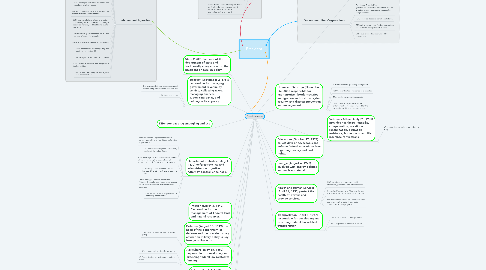Executive Agencies
by chancellor cardwell

1. DEA- combat drug smuggling and use
2. Agriculture- (May 15, 1862) responsible for developing and executing federal law related to farming.
2.1. FDA- in charge of food and drug safety.
2.2. US Forest Service- administers the national forests.
3. Commerce- (February 14, 1903) concerned with promoting economic growth.
3.1. Census Bureau- responsible for recording data of American citizens.
3.2. Patent and Trademark Agency- issues patents and trademarks to producers.
4. Interior- (March 3, 1849) Responsible for the management of Federal land and natural resources.
5. State-(1789) the head of the department of state and traditionally a key adviser to the president on foreign policy.
6. Treasury-(September 2, 1789) responsible for managing government revenue by coining, collecting taxes, managing finances, supervising banks, and helping in fiscal policy.
6.1. IRS- responsible for collecting taxes and administering the Internal Revenue Code,
6.2. US Mint- coin money
7. Labor- (March 4, 1913) responsible for occupational safety, wage and hour standards, unemployment insurance benefits, reemployment services.
7.1. OSHA- ensures safety in the work environment.
8. Department of Justice- (July 1, 1870) enforces the law and administration of justice. Attorney general is the head.
8.1. Solicitor General- represent the federal government of the United States before the Supreme Court .
8.2. FBI- domestic intelligence and security service of the United States.
8.3. ATF- investigation and prevention of federal offenses involving the unlawful use of tobacco, alcohol, firearms, and explosives.
8.4. US Attorney's and Marshall's office- Represent the US in district and appeals courts.
8.5. Office of Legal Counsel- assists the Attorney General's position as legal adviser to the President and all executive branch agencies.
8.6. Civil Rights Division- responsible for restricting discrimination.
9. Defense- (August 10, 1949) the head of the department of defense and the president's key adviser on military policy; a key foreign policy actor
9.1. Joint Chief of Staff- a military advisory group
10. Independent Agencies
10.1. CIA- manages national security.
10.2. EPA- responsible for protecting human and environmental health.
10.3. FCC- regulates radio, television, the internet, and etc.
10.4. FEC- regulates campaign finance.
10.5. FED- central bank of the US.
10.6. FTC- manages consumer protection and regulates big businesses.
10.7. NASA- in charge of the space program an aeronautics/aerospace research.
10.8. SEC- responsible for protecting investors, maintaining fair and orderly functioning of securities markets, and facilitating capital formation
10.9. Smithsoniam- government museums and centers of scientific research.
10.10. SSA- administrates American social security.
10.11. USPS- responsible for transporting and receiving mail in the US.
10.12. NEA- supports and funds art projects.
10.13. NEH- supports research and programs in the humanities
10.14. EEOC- enforces civil rights laws against work discrimination.
11. President
12. EOP
12.1. NSC- advises president on matters dealing with domestic, military, and foreign security.
12.2. OMB- administers the federal budget.
12.3. CEA- advise president on macroeconomic matters.
12.4. White House Office- advice president's political and policy interests lead by White house chief of staff and appointed by the president.
13. TVA- created during the new deal in order to provide jobs to people in the Tennessee valley area through public development projects.
14. Energy- (August 4, 1977) involved with energy policies and nuclear material.
15. Homeland Security- (November 25, 2002) responsible for anti-terrorism, border security, immigration and customs, cyber security, and disaster prevention and management.
15.1. ICE- enforce laws governing immigration.
15.2. FEMA- coordinates a response to a disaster.
15.3. TSA- public transportation security.
15.4. Coast Guard- responsible for the enforcement of maritime law and for the protection of life and property at sea.
16. Transportation- (April 1, 1967) responsible for developing and executing federal law related to transportation.
16.1. Secret Service- monitors espionage.
16.2. FAA- regulates commercial aviation.
17. Veteran's Affairs- (July 21, 1930) provides healthcare, disability compensation, vocational rehabilitation, education assistance, home loans, and life insurance for veterans.
17.1. VA- assists those who have served in the army.
18. Health and Human Services- (April 11, 1953) protect the health of citizens and provide services.
18.1. CDC- conducts and supports health promotion, prevention and preparedness.
18.2. Center for Medicare and Medicaid Services- administers the nation's medicare program.
18.3. Food and Nutrition Service- responsible for administering the nation's domestic nutrition assistance programs.
19. Education- (October 17, 1979) collect data on US schools and enforce federal educational laws regarding privacy and civil rights.
20. Government Run Corporations
20.1. Fannie and Freddie Mac- government-sponsored enterprises that are privately owned, but receive support from the government.
20.2. FDIC- ensures deposits from bank failures.
20.3. AMtrack- a government funded corporation that provided transportation in cities.
20.4. CPB- public broadcasting funded by government.


